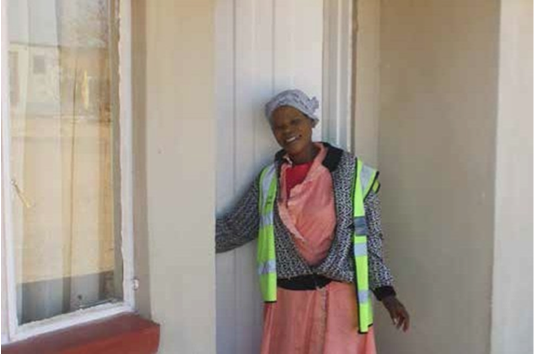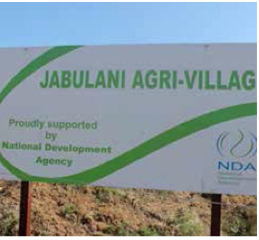Jabulani: A homely jungle with a view
Jabulani: A homely jungle with a view sadminAt 62, pensioner Kattie Sibiya had given up hope of ever owning her own house. But then the Mpumalanga Department of Rural Development started building houses for people in her neighbourhood of Jabulani, 36 kilometres outside Piet Retief in Mpumalanga.
 Sibiya’s fortunes changed when paper company Mondi and the Mpumalanga Government formed a private/public partnership to improve the lives of people living on Mondi property.
Sibiya’s fortunes changed when paper company Mondi and the Mpumalanga Government formed a private/public partnership to improve the lives of people living on Mondi property.
A delighted Sibiya said; “I was born in this area and grew up here. I never thought that I would own a house. Before, my family and I were living in a mud house that was very cold in winter and the roof leaked during the rainy season. I am very happy to finally own such a beautiful house.”
The drive from Piet Retief to Jabulani starts off smoothly on a tarred road. But as you approach Jabulani, you enter a mini forest, and with it, a gravel road.
For a second along the bumpy ride, you begin to wonder whether there is human life among the tall gum trees that dominate the landscape. Deep in the mini forest, the air is crisp and the view of rows upon rows of trees is breath taking. Nestled deep in the forest are rows of grey houses with green roofs. From here, you have a spectacular view of the Morgenstond Dam. Contractors are on site, giving shape to a new multi-purpose centre and renovating the local school.
Jabulani falls under the Mkhondo Municipality where about 80 000 hectares of land belonging to Mondi is situated. The full name of the village is Jabulani Bafazi, which means “women be happy”.
Spokesperson for the Mpumalanga Department of Human Settlement, Freddy Ngobe said 33 housing units have been built as part of the project.
“The units were funded by the Department of Rural Development as a pilot project of the Comprehensive Rural Development Programme (CRDP), which is being delivered at seven poverty-stricken municipalities including Mkhondo.
“The Provincial Department of Human Settlements was responsible for the facilitation of beneficiaries, monitoring and inspection of the project and preparing payment certificates for the Department of Rural Development.”
Ngobe said the houses cost the department R2 million.
The project is planned as a sustainable human settlement with social facilities such as a school, a community hall, a multipurpose centre sports facilities and worship sites.
The Department of Human Settlements built the houses and Mondi contributed top-up funding to enhance the houses into environmentally and thermally friendly living spaces with water-harvesting features, ceilings and roof finishes, said Maurice Makhathini who is the Head of Land at Mondi.
Sibiya is one in the fi batch of people to receive a house from the 33 units. She lives in a two-bedroom house with a kitchen, lounge and bathroom. She shares the house with her son and grandson.
Ngobe said the department would soon appoint a service provider to build 78 more units in the area.
 The idea of developing Jabulani followed a visit to the area by Mondi board members seven years ago.
The idea of developing Jabulani followed a visit to the area by Mondi board members seven years ago.
“A survey we conducted during 2007 and 2008 revealed that about 10 000 people arranged into about 3 500 households lived in 61 villages with minimal to no services, earning very low incomes and highly dependent on government grants,” said Makhathini.
Makhathini said when the company bought the farmland, there were people who had historically lived on the land and the company could not just remove them. “In 2008, Mondi approached the Office of the Premier in the province. The Premier immediately embraced the project. Mondi then signed a memorandum of understanding to develop the area with the Mpumalanga government, Umkhondo Municipality and the Gert Sibande District in 2009 to work together.”
The development of Jabulani is part of a pilot project, which would focus on decent housing, electricity, water, sanitation and creating opportunities for economic development in the area.
As part of upgrading the area, the local school, Thathukusa Primary School is being extended. The school had three classrooms where some grades were combined. The school will now have a stationery room, an office, two extra class- rooms and a hall. Adjacent to the school is the multipurpose centre site. The National Development Agency (NDA) sponsored the building of the multipurpose centre.
A funding application was submitted to the NDA in 2011 and approved in 2012 for a R3,2-million grant to build the multipurpose centre. The centre will house a kitchen, a community hall, offices, youth centre, adult centre and four stores.
When the development of the community was initiated, a legal entity in the form of a Communal Property Association (CPA) was formed to represent the interests of residents.
Chairperson of the CPA, Nhlanhla Nhlabathi expressed appreciation to government and Mondi for developing Jabulani and said the area has the potential to develop as a tourist destination.